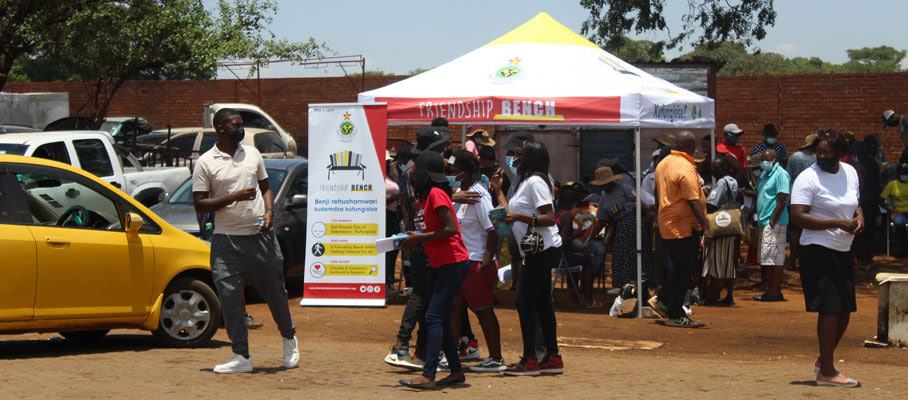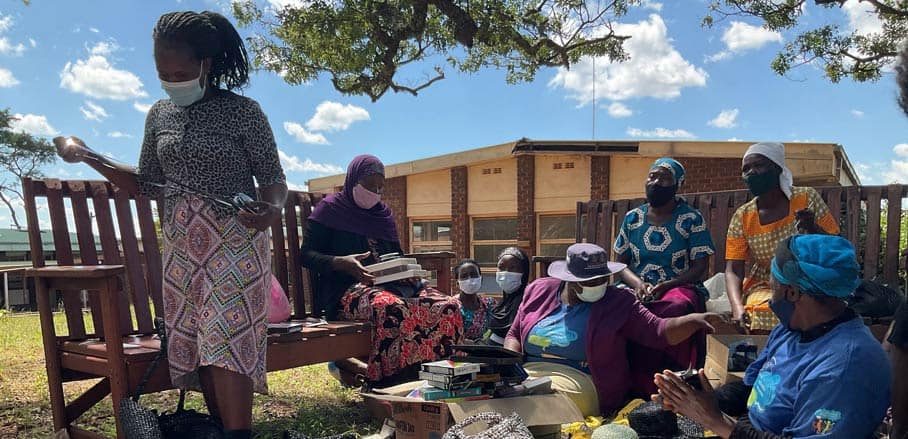“It Is Ok To Not Be Ok” – How A Mental Health Programme Changes A Community
The Friendship Bench is a community-based mental health counselling programme from Zimbabwe. Dr Ruth Verhey reflects on the contributions of such programmes to liveable communities for all.
“Masikati, Gogo!” 32-year-old Tendai (name changed to protect privacy) calls out to a health promoter who walks past her stall where she sells tomatoes, bananas, and maputi (a kind of popcorn) near her house in a township in one of the Zimbabwean cities. A while back, Tendai had been speaking to this health promoter, who works as a Friendship Bench (FB) counsellor. She knew she wasn’t feeling that strong with all the worries that had accumulated over time and just no way out. After her husband left her, she was looking after her small children by herself and could not make ends meet. She had started to sleep badly and cried a lot. She felt very guilty about feeling very hopeless and was diagnosed with hypertension.
At first, she did not know that there was support available in her community. When the FB counsellor started to tell her about “kufungisisa” (which translates to “thinking too much”), she felt like finally, someone understood her and a weight was lifted off her shoulders. They had a long conversation about her problems, what she would like to change, and how she could go about it.
The Friendship Bench Programme: From Zimbabwe to the World
Common mental disorders such as depression and anxiety contribute heavily to the burden of disease globally. The Friendship Bench programme is a community-based mental health care service that was developed in Zimbabwe in 2006 to bridge the large treatment gap. The programme has been expanded to over 109 primary health care (PHC) clinics in urban and rural settings and has reached 85,209 people in need in the time period between 2019 and 2022.
When thinking of scaling up a programme, all stakeholders must be included from the start to create a mutual understanding of the goal and the way to get there. We are currently rolling out the Friendship Bench nationwide in Zimbabwe. Internationally, we work with partners such as universities, NGOs, health departments or associations and thereby have reached communities in Zanzibar, Malawi, Kenya, Jordan, Vietnam, the United States, and Canada.
Raising Awareness, Enabling Access, and Overcoming Stigma
FB counsellors are employed as Community Health Workers (CHWs), are trained in the manualised FB model, and receive regular supervision and continued education.
They raise awareness about general health issues, people’s mental health needs and common mental disorders, and invite people to the FB programme, which is available free of charge and emphasises confidentiality.
Besides offering evidence-based one-to-one counselling on a bench and, since the COVID-19 pandemic is additionally online or over the phone, FB has a support group component that focuses on income generation for participants. Its activities improve livelihoods for those most in need and are centred around producing consumables such as arts and crafts, cleaning products, making bread, or running a poultry project to supply eggs, to name a few.
Tendai had several sessions with the FB counsellor and became part of the FB support group where she engaged with others on income generation activities. She regularly goes to the group meetings to meet her new “sisters who understand her”.
The Friendship Bench programme has contributed to PHC clinics becoming spaces where people can choose to actively work on finding solutions for issues they are confronted with. These issues are mostly centred around unemployment and poverty (mostly transgenerational), relationship quality and interpersonal violence, housing, or chronic illness.
In a low-income country like Zimbabwe, people have restricted options to address the difficulties they are encountering. This forces people to be creative, and the FB program aims to bring in the step-by-step problem-solving process to empower people to improve their lives and well-being.
The Friendship Bench programme makes efforts to create awareness about mental health. A society, in which correct information is actively disseminated and more easily available will enable a stigma and social judgment reduction process that is severely needed. Stigma is seen as a major barrier to seeking support and thus contributes to the high prevalence of loneliness, suicidality, substance use, and violence in communities.
We work towards attitude change in everyone so that people feel less ashamed to speak out. The counsellors are trained to be non-judgmental to create opportunities for genuine interpersonal connection, in which people feel safe enough to share their own stories and reflect on their emotional experiences. The counsellors are taught to use counselling skills such as empathy to build trust as well as active listening and use of open-ended questions.
When the COVID pandemic began, the FB activity spots had to change to a more community-based approach, as PHC clinics reduced their health care activities due to the restrictions. FB counsellors started to talk to clients on the streets of their communities, at the community borehole, in the marketplace, and in or outside their homes, making the programme both more visible and accessible. The support groups also started to be run in participants’ or FB counsellors’ homesteads.
Tendai learned about “kufungisisa” and what it does to people. She was approached by the FB counsellor about whether she wanted to talk. Luckily, Tendai took up the offer.
Friendship Bench activities are supported by awareness campaigns using radio and social media. This has become a successful way of reaching people, and those in need of support who are interested are now self-referring to the programme.

Mental health awareness campaign
© Friendship Bench
Friendship Bench Zimbabwe: A Model for Liveable Communities Everywhere
With the growing global interest in mental health care for everyone, the WHO has recently started its mental health special initiative. Zimbabwe is one of the selected countries and Friendship Bench is supported as a programme that is seen to be feasible and acceptable by community members in both urban and rural settings.
We can create a context in which it is easy for people to reach out and receive uncomplicated, easily understood, and evidence-based help. We need to realise how big the need for community-based support for wellbeing globally is and that only as a community that is characterised by trust, reliability, and engagement we can make a difference for all of us.
Every dollar that is put into building a sense of belonging to a community is well invested and will contribute to people feeling connected and safe. In times of uncertainty and stress, we need this more than ever.
All of us can create a world that has better mental health care available for everyone: by speaking genuinely about mental health needs, even our own, by learning about the effects of stigma and how to reduce it, and by actively seeking opportunities to create connection. This way, we can contribute to the prevention of more severe presentations of mental disorders and save lives.
Tendai found the courage to start up her very small business selling vegetables, and she has plans to expand it. Although her income is currently still minimal, she is hopeful again. She said she didn’t know it was ok to not be ok and that there was help. She feels better now and says: “A problem that is talked about is a solved problem!”
